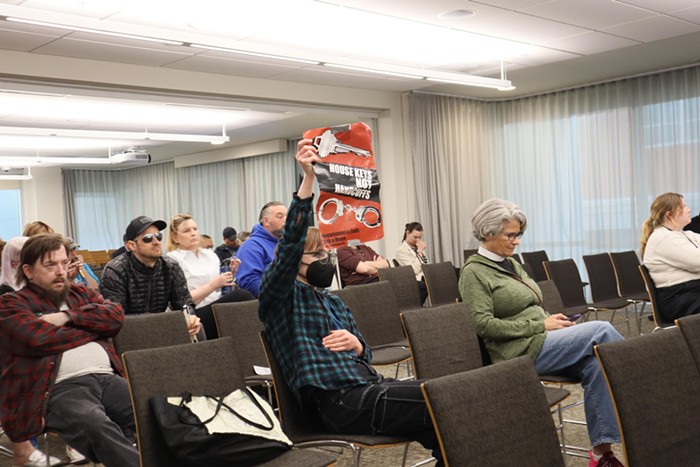The Oregon Food Bank (OFB) says it hasn’t seen a big financial loss since losing support from a number of Portland-based Jewish organizations after the food bank called for an “immediate and permanent ceasefire in Israel’s war against Palestine.”
OFB says the loss in support is less a financial burden, but rather emotional.
“We experience grief when our donors determine they can no longer support our mission,” Morgan Dewey, the media and engagement manager for OFB, said. “We have also heard from a number of people, including people who identify as Jewish in their communications with us, that they are increasing their support to Oregon Food Bank as a result of our statement.”
A dozen local Jewish organizations publicly pulled their support from OFB over the food bank’s recent statement, which condemned the terrorist attack by Hamas on Oct. 7, as well as the "indiscriminate attacks" by the Israeli army on Palestinians, including a strike on humanitarian aid workers delivering food to Gaza. The organizations say OFB's statement is antisemitic. Not everyone agrees with the move.
The Portland chapter of Jewish Voice for Peace (JVP), a self-described progressive anti-Zionist organization, released an open letter in full support of OFB and began a campaign to drive donations for them.
In the letter, JVP said halting donations to OFB was “an unconscionable affront to Jewish values that only serves to punish the most vulnerable members of our community.”
Nevertheless, the Jewish Federation of Greater Portland, along with 11 other local Jewish organizations and congregations, accused OFB of expressing bias against Israel in their statement.
“Antisemitism is on the rise in our country,” Marc Blattner, president and CEO of the Jewish Federation of Greater Portland, told the Mercury. “One-sided statements that solely focus on Israel help to fan those flames, whether intentionally or not.”
Blattner also pointed out that the signatories of the Jewish coalition statement would still run food drives and work with other local food organizations.
OFB disagreed that they are fueling antisemitism. In their statement they condemned the actions of Israel and Hamas and expressed their concern with the recent rise in antisemitism and Islamophobia.
The crisis in Gaza has sparked mass protests across the country, and led businesses, unions, universities, and local governments to weigh in. It’s also fractured Jewish communities across the United States and even in Israel. While the narrative is often presented as black and white, some say it’s more nuanced than that.
Adam Segal, an organizer with JVP, understands that there are many Jews experiencing generational trauma from the Holocaust, but feels the narrative that Jews cannot be safe without Israel is false and problematic.
“Our safety will never rely on the brutalization and genocide of another people,” Segal said. “Israel has put a lot of effort into encouraging American Jews to believe that our safety relies on the maintenance of an ethnostate on Palestinian land, and that without that dominance no Jews anywhere would be safe. It’s simply not true.”
Blattner says the Jewish Federation of Portland has no issues with legitimate criticism of Israel, but he feels the statement from OFB didn’t fairly express that Israel is battling Hamas rather than a civilian population.
OFB stated they are “outraged by the Israeli army’s reckless killing of food aid workers.” They also called for the entry of humanitarian aid into Gaza, citing that “over 50 percent of the entire population has been driven to catastrophic famine levels of starvation.”
Both Blattner and Rabbi Michael Cahana of Congregation Beth Israel say Israel has provided humanitarian aid and assistance to the people of Gaza throughout the war. However, aid agencies in Gaza claim Israel has blocked aid from entering, and even when aid was coming in, it has been insufficient to meet the overwhelming need.
The coalition of Jewish organizations also questioned why OFB had not made political comments on international issues of hunger in the past, suggesting its singular focus on Israel may be antisemitic.
Segal takes issue with this idea, calling it “immoral and thoughtless.”
“That concept is an absolute race to the bottom, because what they're really saying is we don't deny, because we can't deny, that Israel is intentionally starving the Palestinian population, which is a war crime,” Segal says.
Despite opposing views espoused by the Jewish Federation and JVP, Rabbi Cahana and Blattner say they don’t think Portland’s Jewish population is fractured over the war in Gaza.
“I believe the vast majority of Jews in Portland stand with Israel and its war against Hamas and want to see the return of the hostages,” Blattner said, adding that “Jewish Voice for Peace is a self-proclaimed anti-Zionist organization that supports any and all statements that demonize Israel. Therefore, we are not surprised by their support for the OFB.”
Segal on the other hand says “JVP Portland feels the Jewish Federation falsely tries to speak for all Jews and attempts to minimize dissent by framing others as radical or fringe… a lot of Jews, myself included, are proudly criticizing Israel. And we are very proud of being Jewish and are not the least bit self-hating or anti-Semitic.”
JVP Portland and OFB are not the only organizations to face pushback for their comments about Israel. Last week, the Portland Association of Teachers took down education materials that were considered antisemitic and inappropriate by some Jewish parents and leaders.
The curriculum the union distributed to educators is a collection of external resources organized for different grade levels. The content covers a variety of topics including Palestinian culture, resistance, occupation and colonialism, as well as genocide and ethnic cleansing in the context of Palestine.
After Jewish community members and organizations took issue with the use of words like “colonizer” and “genocide” to describe Israel and the current war, the teachers union removed the materials as claims circulated that the curriculum was “extremely one-sided” against Israel.
The debacle played out as universities and K-12 schools across the United States are grappling with how to address a rise in antisemitism that began before the conflict between Israel and Hamas.
While some equate criticism of Israel’s war against Gaza with antisemitism, others say Israel’s military actions aren’t reflective of the Jewish diaspora.
Mara Zusman, a Jewish parent at Portland Public Schools and member of JVP Portland says “teaching about the violence against Palestinians is a moral imperative.”
“Criticizing a government responsible for apartheid and genocide is not antisemitic; it is a call for human rights,” Zusman says. “PPS students demand education on Israel and Palestine, and it is our duty to engage honestly.”
As for OFB, the organization is sticking to their position, thanking the community for their support.
“We are proud to be part of a worldwide network of anti-hunger organizations and felt compelled to make our statement due to our mission of ending hunger and its root causes,” Dewey, of OFB, said. “We call on the community to direct our united energy in supporting the people in Gaza, who, since the release of our statement on Israel’s violence in Gaza, are now facing full-blown famine.”



















